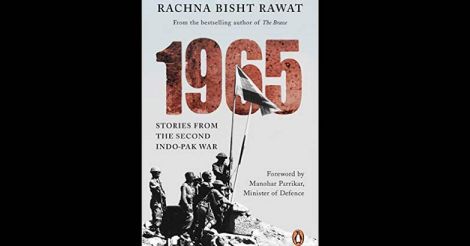Title: 1965-Stories From The Second Indo-Pak War
Author: Rachna Bisht Rawat
Publisher: Penguin Books India
Pages: 189
Price: Rs 299
When Pakistan launched a full-scale war against India in 1965 and prime minister Lal Bahadur Shastri announced a "fitting reply", Army commanders were quick in deciding India would also capture enemy land to get an edge in international negotiations which they felt would be inevitable after the conflict ended.
This is one of many accounts in this book, which has been written by Rawat after speaking to a number of veterans.
The book includes five key battles from the 1965 war and is backed by extensive research, interviews and profiles of war veterans, and has been termed by the Indian Army as an "authoritative narrative" of the conflict.
"On the morning of 1 September 1965, the nation woke up to a startling announcement on All India Radio. Pakistan has launched a massive attack with tanks and heavy artilley in the Chamb sector of Jammu and Kashmir. The enemy's objective seems to be the strategic Akhnoor Bridge. Prime Minister Lal Bahadur Shastri has declared that Pakistan will be given a fitting reply by Indian Army," the book says.
It quotes Lt. Gen. Harbaksh Singh, the Western Command chief, terming this "the tallest of decisions taken by one of the shortest of men".
"The general outline of the 'fitting reply' that Lt. Gen. Harbaksh Singh drew up had the Indian Army holding ground as close to the international border as possible in the Punjab and Rajasthan sectors and destroying any enemy that crossed over. He also planned on crossing the International Border and acquiring a large chunk of enemy territory which would give India a bargaining level in the political talks that would be inevitable after the war was over," the book says.
In its account of the Battle of Asal Uttar, the book says Company Quartermaster Havildar Abdul Hamid was on his recoilless gun, less than 30 metres from the road with his jeep hidden under the cotton crop.
As the first tank came within shooting range, CQMH Hamid fired, setting the tank ablaze.
"We were surprised to see the crew of two more tanks that were following, abandon their tanks and flee," the book quotes Lt. Col. Hari Ram Janu (retd) as saying.
"We then realised that the Pakistanis fear of being burned alive since their religion says that makes them kafirs," he added.
On the first day, Indian soldiers destroyed four tanks by recoilless-gun fire and five were abandoned.
Some mines were laid down in the night, but the Grenadiers could hardly sleep when Sabre jets started flying over. The next day saw more tank attacks, with India disabling at least four more, while some were destroyed by the mines.
The following day saw CQMH Hamid destroy his sixth tank. He spotted the seventh tank at the same time it spotted him.
"There was no time to change position in the face of relentless artillery fire. Telling his driver and loader to get under cover, he aimed. Simultaneous explosions rent the air - the tank as well as Hamid's jeep blew up simultaneously," the book says.
The book also details the battles of Haji Pir, Phillora, Barki, and Dograi - all through the eyes of the veterans who were in the thick of the action.
(With agency inputs)



































































































































































































































































































.jpg.image.160.84.jpg)





































































































































.jpg.image.160.84.jpg)











































Disclaimer
The comments posted here/below/in the given space are not on behalf of Manorama. The person posting the comment will be in sole ownership of its responsibility. According to the central government's IT rules, obscene or offensive statement made against a person, religion, community or nation is a punishable offense, and legal action would be taken against people who indulge in such activities.